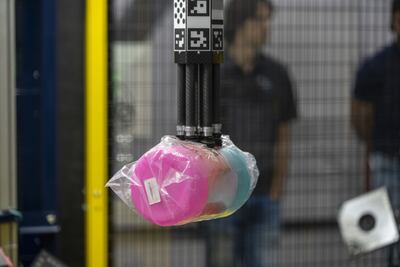US technology company Amazon introduced its latest robotic system “Sparrow”, which aims to do repetitive warehouse jobs and boost product handling in its operations.
Sparrow is the first robotic system in the world’s biggest e-commerce company’s warehouses that can detect, select and handle individual products in its inventory without any major human intervention.
Amazon unveiled Sparrow before a select gathering of media at BOS27, the company’s innovation and manufacturing hub in Westborough, Massachusetts, on Thursday.
Leveraging computer vision and artificial intelligence, Sparrow can recognise and handle millions of items, the company said.

“We knew we had an opportunity to dig deeper into research and development to support individual product handling. We have millions of products of all shapes and sizes in our inventory, and we recognised the opportunity to invent new technology that could help handle them at Amazon’s scale,” it said.
Last year, with the support of various technologies, Amazon employees around the world picked, stowed or packed about five billion packages — or more than 13 million packages per day.
“Robotics technology enables us to work smarter, not harder, to operate efficiently and safely,” Amazon said.
Amazon’s other robotics arms, including Robin and Cardinal, can redirect packages in warehouses, but additional technology was needed to address a critical part of the fulfilment process that happens before items are even packaged for shipment to customers.
Working with employees, Sparrow will be able to take on highly repetitive tasks that will allow employees to shift their time and energy to higher-level and more engaging work while advancing safety, Amazon said.

“At the same time, Sparrow will help us drive efficiency by automating a critical part of our fulfilment process so we can continue to deliver for customers.”
Nearly three quarters of the five billion packages processed by Amazon annually are handled by robots in at least one part of the delivery process, the company said. The new robotic arm can identify about 65 per cent of Amazon’s product inventory.
Amazon is continuously investing to improve its robotics technology.
In September, the company announced acquiring Cloostermans, a Belgian firm that produces technology used in warehouses. In August, Amazon said it would buy iRobot — maker of the Roomba vacuum — for $1.65 billion, as the company continues to boost its presence into internet-connected home devices and robotics.
In 2012, it acquired Kiva Systems, which later evolved into Amazon Robotics, for $775 million.


